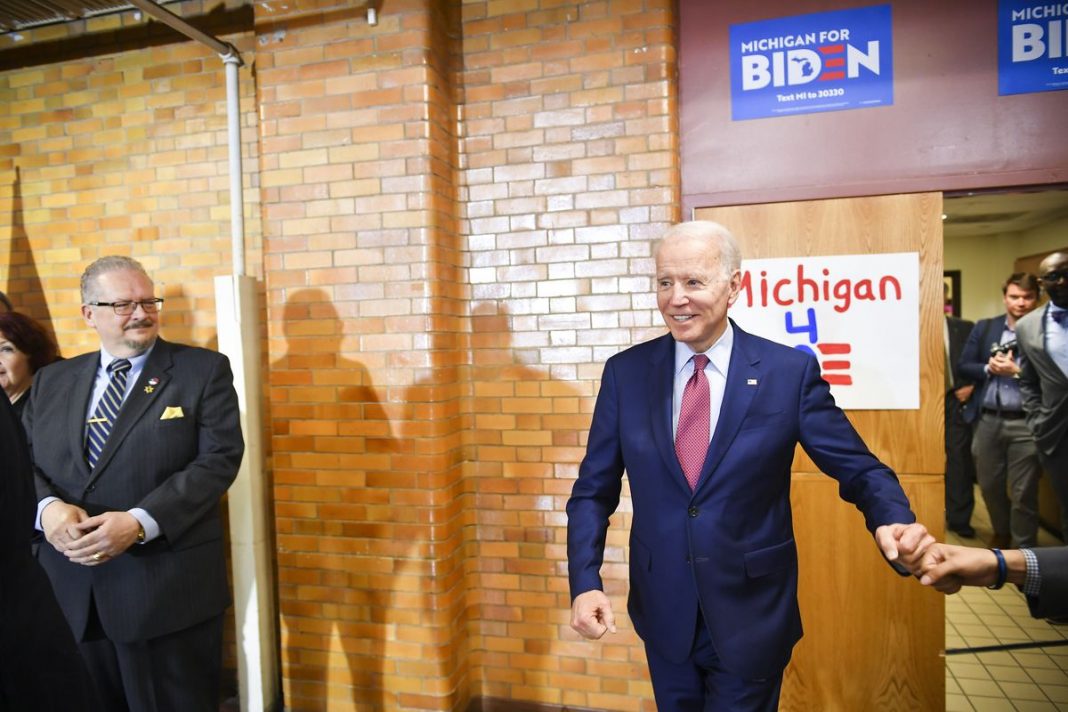Joe Biden became the presumptive nominee of the Democratic Party on Tuesday night.
The former vice president has all but vanquished the insurgent campaign of Senator Bernie Sanders and guaranteed that he will have one final chance, at the age of 77, to cap a five-decade political career with the biggest prize of all.
The general election against President Trump is less than eight months away.
The battle is sure to be fierce and bruising. But, for now, Biden can take satisfaction from victory in a contest where he seemed doomed just a couple of weeks ago.
The primary came to an end, at least as a meaningful contest, just after 9 p.m. ET Tuesday when Biden was projected as the winner of the Michigan primary as soon as the final polls closed.
Four years ago, Sanders had pulled a surprise, defeating eventual nominee Hillary Clinton in the Wolverine State. He threw everything into the fight again this year. It didn’t work.
Even before the Michigan result was declared, Biden had also been projected as the winner of primaries in Mississippi and Missouri.
In the primary writ large, Biden’s resilient popularity with black voters was the keystone of his success.
It was black voters who delivered the thumping victory that saved his candidacy in the Feb. 29 South Carolina primary; black voters who undergirded his pivotal performance on Super Tuesday; and black voters who again delivered for him in Michigan on Tuesday.
Biden defeated Sanders by nearly 40 points with African American voters in the state, according to exit polls — even though the Vermont progressive had won the endorsement of black civil rights leader Jesse Jackson in the final run-in to polling day.
In Mississippi, where African Americans make up a higher percentage of the population than any other state in the nation, Biden annihilated Sanders, winning by more than 60 points.
But there are other things going on, too.
Democratic voters are desperate for one thing above all: the defeat of Trump come November.
Biden never relinquished his hold on the claim that he was the best candidate for the job.
His purported strength in the industrial Midwest was a clinching argument in his favor. Democrats believe he can rebuild a wall that Trump demolished — the “blue wall” of Michigan, Pennsylvania and Wisconsin — and win back the White House.
It also became more apparent as the primary went on that Democratic voters found Biden’s promise of a return to normalcy after four years of Trump’s tumult more alluring than Sanders’s call for wholesale change.
In a speech Tuesday evening, as results were still coming in, Biden echoed themes of his campaign by warning that “our very democracy is at stake in this election” and that a second Trump term would “change the character of this nation.”
Biden’s promise, in effect, is to be a balm after Trump’s belligerence. The American people, he insisted in his speech, want “a president who not only knows how to fight but knows how to heal.”
But is Biden tough enough to win the largest looming fight?
In private conversation, even Democrats who are broadly supportive of him betray nervousness.
The former vice president has often faltered on the debate stage this cycle. At times, he has seemed meandering and unfocused.
On MSNBC Tuesday night, former Obama aide David Plouffe, even while being complimentary overall, made diplomatic reference to “appropriate concerns about Biden’s performance.”
The Trump campaign will not be so polite.
The president and his media allies are already pumping up the volume on doubts about Biden’s mental acuity and his capacity to handle the world’s most demanding job.
There is also the question of whether normalcy and business-as-usual is really what the voters are looking for.
Trump and former President Obama — opposites in a multitude of ways — each offered voters a sharp change from the status quo, and won.
Biden is a creature of the status quo, not a disrupter of it.
He has been a Washington fixture since the 1970s. He is given to fond reminisces of his time in the Senate — memories that can encompass warm feelings toward hard-line Republicans and outright racists. He is an incrementalist, not a change agent.
To some voters, that holds great appeal. Others, especially the young, seem immune to its charms.
Even during Biden’s night of triumph on Tuesday, the warning lights were blinking.
According to the Michigan exit polls, he lost voters under 30 to Sanders by almost 60 points.
Will those young voters — and others fired up by Sanders’s idealism — rally to Biden’s side come November? It’s possible, for sure — but it’s far from guaranteed.
Still, Biden seems likely to be spared the prolonged primary fight that Hillary Clinton endured in 2016.
Sanders has no effective path forward at this point, and the signs are that he knows it.
Sanders returned home to Vermont on Tuesday and did not address supporters or the media. The senator, 78 and only recently recovered from a heart attack, has little obvious reason to fight to the bitter end this time around.
Tuesday was Joe Biden’s night.
A turbulent Democratic race is beginning to calm.
But the high drama of a presidential fight for the ages has barely begun.
(The Memo is a reported column by Niall Stanage, primarily focused on Donald Trump’s presidency.)



